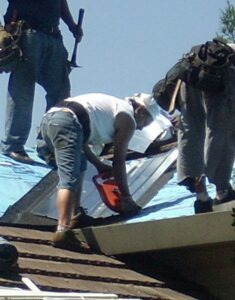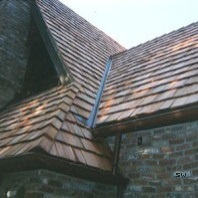Valley Metal - Do I Need it On My Roof?

 Valley metal is used on most types of steep-sloped roofs where two roofs intersect.
Valley metal is used on most types of steep-sloped roofs where two roofs intersect.
This is a very important part of the roof. Just like a mountain with peaks, ridges, and valleys, the valleys carry a lot of water down the mountainside, so too with our roofs. We have on our roofs ridges and peaks that drain downwards to the valley and those valleys carry the water to the bottom edge of the roof. With roofs these days, having lifetime warranties, this makes the valley crucial to the roofing system that lasts.
Most valleys are made with galvanized sheet metal. Shakes, cedar shingles, and asphalt shingles roofs used a W-shaped valley metal.Called that because of its shape. The rise in the middle keeps the water from splashing up from one side to the other creating a trough and carrying the water down towards the gutter.
Tile roofs, like this one to the right, have the center rib and two other on each side to control the debris from clogging up things. A tile roof stands up off the roof a little and allows this type of valley to be used. This type of valley is becoming more popular than the W valley with hemmed edges since these types of valleys are prone to clogging up and leaking after a few years.
Steel coated panels used a deeper trough to catch the drainage because of it standing even taller off the roof. There are variances to the use of valley metal or not. For example, asphalt type roof uses valley metal and yet, sometimes are weaved because the roofing materials are pliable and easy to form.

Slates roofs use a cant strip and create what I call a canoe valley. The cant strip gives the roof deck a radius that allows the tile or slates to lay flat and fit together better. There are different types of a canoe valley some miter every piece, some install a flat piece of metal under every course. but this photo to the left is a really unique style I saw on my Facebook friends page from Europe. Notice the direct nailing to the sheathing without any felt. I would not recommend this but it must work for the climate this is from.
This canoe part of the valley is laid up the valley, then the field tiles are cut and installed over the canoe edge, probably with taper tile to lay nicely.
When hiring your roofer make sure you understand what the valley detail is being proposed for the roof being installed and why? They all require different types of details and can be done in many different ways in different parts of the country and world.
Tip, For you "do-it-your-selfer's” buy two Stanley knife holders. Keep one with a hook blade and one with a straight blade. Having both ready to work for you saves time changing them back and forth. When doing an asphalt type roof the hook blade will cut the asphalt shingles and preserve the sharp edge of the straight blade.
Have a question? AskARoofer.
Find your local roofing contractor in the RoofersCoffeeShop® Contractor Directory.
Recommended For You

Q & A - Fire Ratings for Roofing Materials
Read More ...
Q & A - Rusty Roof Flashings
Read More ...
Q&A - Cedar Shingles on Walls?
Read More ...







Comments
Leave a Reply
Have an account? Login to leave a comment!
Sign In